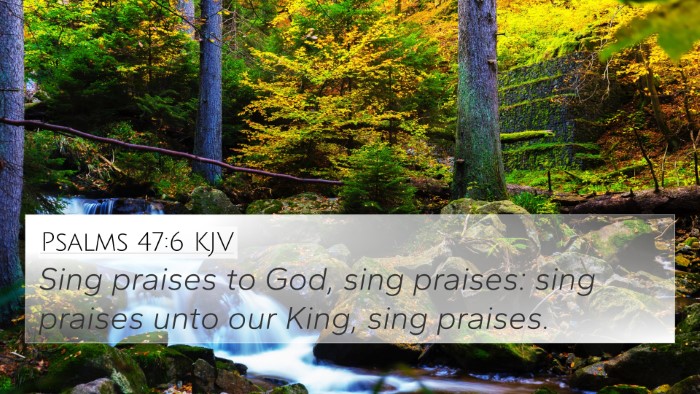Psalms 5:2 - Understanding the Verse
Psalms 5:2 states, "Hearken unto the voice of my cry, my King, and my God: for unto thee will I pray." This verse is a profound expression of David's relationship with God and his reliance on divine guidance through prayer.
Summary of the Verse
The psalmist David is appealing to God to listen to him during a time of distress. He acknowledges God as his King and God, emphasizing the authority and power that God holds in his life. This highlights a dual relationship as both sovereign and personal deity.
Commentary Insights
Matthew Henry's Commentary
Henry emphasizes the personal nature of David's cry, recognizing his relationship with God as intimate and urgent. The use of "my King, and my God" shows his deep trust and recognition of God's sovereignty and intimate care. David's prayer reflects a need for God's listening ear— a theme common in psalms where the psalmist seeks divine intervention.
Albert Barnes' Notes
Barnes explains that David’s appeal to God as "my King" signifies acknowledgment of God's rule over his life. The phrase "unto thee will I pray" reinforces that prayer is not a mere ritual, but a heartfelt plea for guidance and support. He notes the urgency in the psalmist’s tone, indicative of distress and a need for immediate divine help.
Adam Clarke's Commentary
Clarke provides insights into David's longing for communion, suggesting that prayer is both a discipline and a supportive lifeline. He also notes that addressing God as "my God" denotes a personal relationship—the privilege of an individual to call upon the Almighty resonates deeply throughout scripture. Clarke highlights the universality of distress in human experience, making David's psalm relatable to believers today.
Cross-References for Psalms 5:2
-
1 Samuel 8:7: God's response to Israel's plea for a king, marking the relationship between divine authority and human governance.
-
Psalm 55:1: "Give ear to my prayer, O God; and hide not thyself from my supplication." This reflects a similar cry for God’s attentiveness.
-
Psalms 3:4: "I cried unto the Lord with my voice, and he heard me out of his holy hill." Again, emphasizing God's listening ear.
-
Psalms 28:2: "Hear the voice of my supplications, when I cry unto thee." This shows the psalmist's呼intonation for God's attention during prayer.
-
James 5:16: "The effectual fervent prayer of a righteous man availeth much," illustrating the power and importance of prayer.
-
Hebrews 4:16: "Let us therefore come boldly unto the throne of grace," linking the idea of fearless prayer with divine accessibility.
-
Philippians 4:6: "Be careful for nothing; but in every thing by prayer and supplication with thanksgiving let your requests be made known unto God." This aligns with the call for prayer.
Thematic Connections
Psalms 5:2 serves as a theme of prayer intersecting with hope. Across the Bible, prayer is framed as a means of connecting with God in times of need, reflecting trust and recognition of His sovereignty.
In this way, we see numerous Bible verse parallels where believers invoke God not just as the Almighty but as a personal deity to whom we can address our pleas. This engaging relationship is depicted not only in Psalms but also in other parts of scripture, showcasing the rich tapestry of inter-Biblical dialogue.
Tools for Cross-Referencing
For deeper study, one might consider using Bible concordance tools or a Bible cross-reference guide. Engaging in cross-referencing Bible study allows for a fuller understanding of connections between verses, as seen in Psalms 5:2 with the references outlined above.
Conclusion
In summary, Psalms 5:2 is a heartfelt invocation for God’s attention, embodying both the sovereignty of God and the deep personal relationship between the believer and the Creator. Its themes resonate throughout the scriptures, inviting all to engage in earnest prayer.













